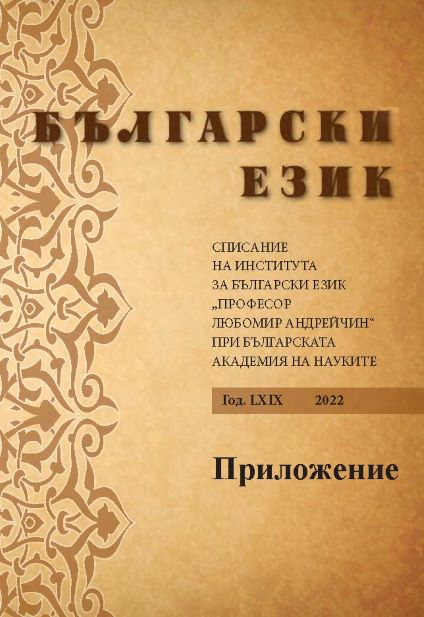Някои типологически индекси на дубитативните предикати в съвременния български език
Typological Indices of Dubitative Predicates in Modern Bulgarian
Author(s): Krasimira AleksovaSubject(s): Language studies, Language and Literature Studies, Theoretical Linguistics, Applied Linguistics, Philology
Published by: Институт за български език „Проф. Любомир Андрейчин“, Българска академия на науките
Keywords: typological indices; dubitative; renarrative; conclusive; indicative; syntheticity; analyticity; composition; markedness of a paradigm member
Summary/Abstract: The study deals with the calculation of some typological characteristics of the dubitative paradigm in modern Bulgarian following G. Gerdzhikov’s theoretical view on typological indices instead of the one favoured by J. Greenberg, as Gerdzhikov’s indices rely on data taken from paradigms and not from texts, which generally bear information about style, register, themes, etc. The variability observed in the microparadigm of the dubitative forms of negative posterior tenses motivates the comparison of four indices proposed in Gerdzhikov’s theory – degree of analyticity, degree of syntheticity, degree of composition and degree of markedness of a paradigm member – applied to four dubitative microparadigms (one positive and three variants of the negative paradigm). Likewise, I compare and contrast the four dubitative indices with the indices of the other three evidentials: the indicative, the conclusive, and the renarrative. As a result, variants of the negative posterior forms are observed in both the renarrative and the conclusive paradigms, and this observation lays the grounds for the comparison of four indices across fourteen evidential microparadigms in Bulgarian. The study also provides evidence that two of the negative microparadigms found in the dubitative present the highest degree of composition and analyticity and that one of them shows a tendency for condensation of the forms that leads to a lower degree of composition and analyticity. Another important conclusion is that in paradigms that have a high degree of composition and analyticity, variants with condensation of forms or paradigm unification are more likely to emerge as a reflection of the tendency to relatively increase the degree of syntheticity and decrease the degree of composition.
Journal: Български език
- Issue Year: 69/2022
- Issue No: Special
- Page Range: 67-95
- Page Count: 29
- Language: Bulgarian

